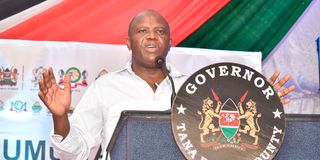High Court upholds election of Dhadho Godhana as Tana River governor

Tana River Governor Dhadho Godhana. The High Court has upheld his election.
The High Court has upheld the election of Dhadho Godhana as the Governor of Tana River County.
While dismissing a petition filed by Mr Hussein Dado, Justice Njoki Mwangi ruled that Mr Dhadho was validly elected and that the election was conducted in accordance with the law.
Justice Mwangi said that despite the Independent Electoral and Boundaries Commission (IEBC) occasioning some missteps and irregularities, they were not of a magnitude that could affect the outcome of the elections.
“The missteps did not affect the elections; the election of Dhadho Godhana was conducted in accordance with the law and the missteps of IEBC were not substantial to affect the results,” said Justice Mwangi.
The judge also ordered Mr Dado and IEBC to pay Sh3 million and Sh2 million respectively to Mr Godhana as costs of the petition.
“IEBC missteps contributed to the filing of the petition, it should also bear the costs,” said Justice Mwangi while imposing the costs to be paid.
On the issue of mistallying of results, as claimed by the petitioner, the court ruled that variances of votes between forms 37 (a) and (c) were minimal.
The judge said there were few errors in mistallying and transposition of votes and cannot be said to have accorded any candidate some advantage.
The court also dismissed the issue raised by the petitioner that the shortage of ballot papers for the governor's position affected the outcome of the results.
Justice Mwangi said the shortage affected all the candidates and it could not be ascertained which one would have been voted for by those said not to have cast their votes due to the shortage of the ballot papers.
The court noted that for the claim to succeed, the petitioner must demonstrate that failure to supply the ballot papers was deliberate thus affecting the outcome.
“The shortage was neither deliberate nor in bad faith since it was not an isolated incident only to Tana River, but the problem can be attributed to IEBC officials,” said Justice Mwangi.
The court noted that the electoral agency officials could have been diligent to ascertain that the printing of the ballot papers was in order.
Justice Mwangi ruled that there was no proof that voters in some polling stations failed to vote as a result of faulty Kenya Integrated Elections Management Systems (Kiems) kits.
Mr Dado filed the petition challenging the election of Mr Godhana citing a flawed election process during the gubernatorial elections for Tana River county in last year’s General Election.
Through his lawyer, Mr Dado said that the election failed to meet the threshold of the democratic election system.
He further argued that the election process for the governor was irredeemably compromised hence the court ought to nullify the elections.
Mr Godhana, on his part, argued that an election court cannot void an election on mere errors and infractions and that he was validly elected.
On its part, IEBC said that the voting process went on smoothly and that the election was free, fair, and credible arguing that observers gave it a clean bill of health.





